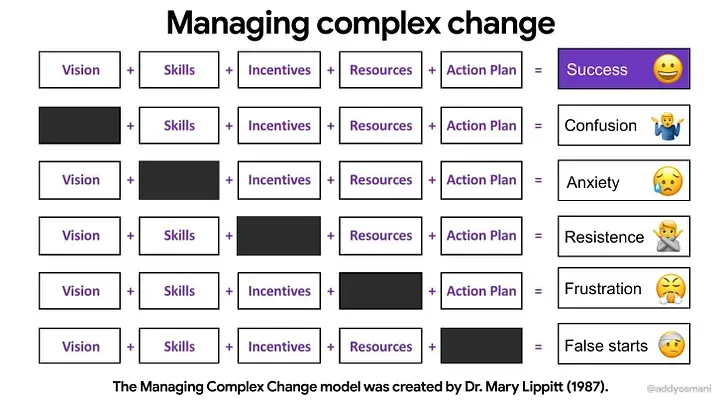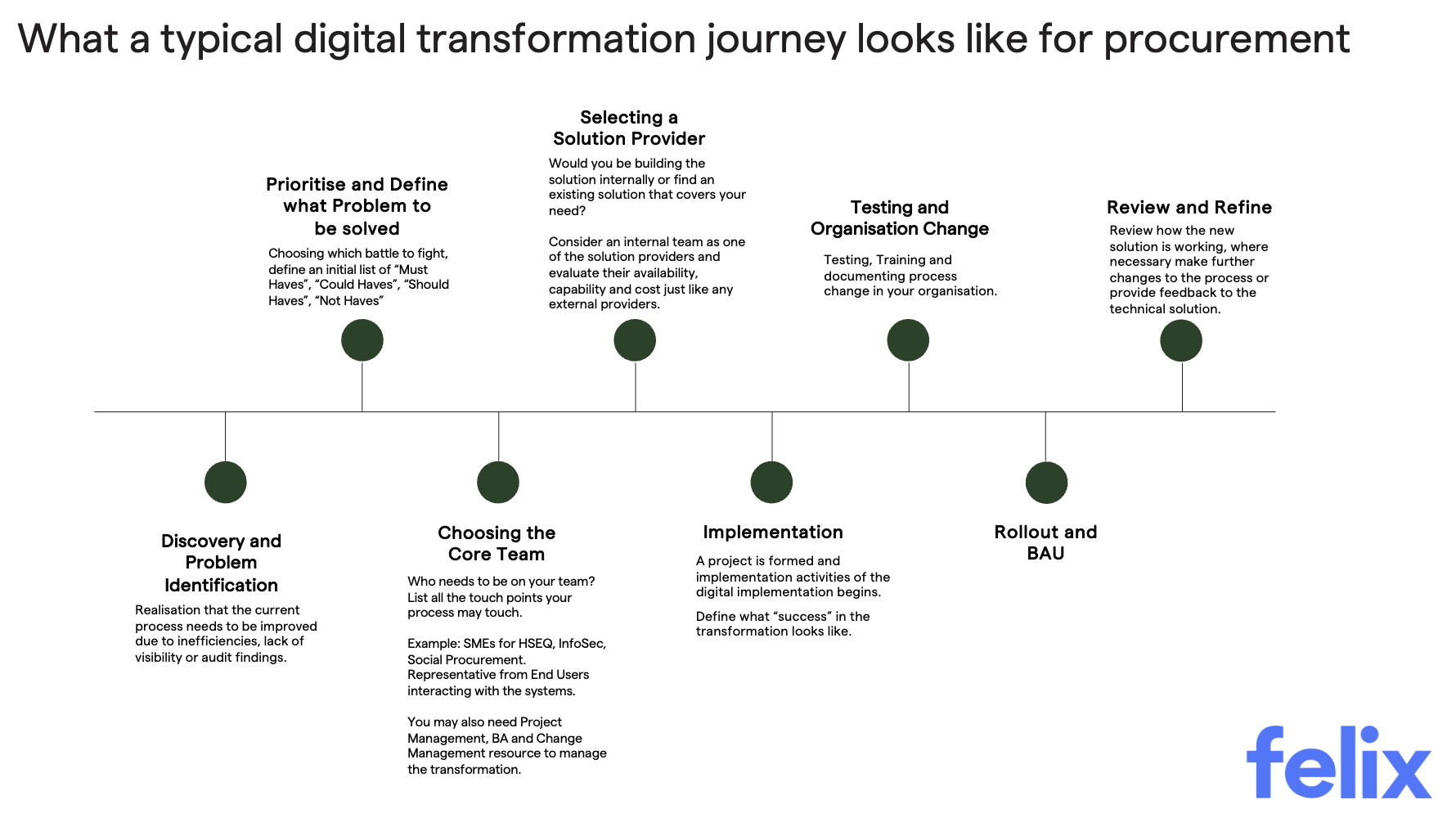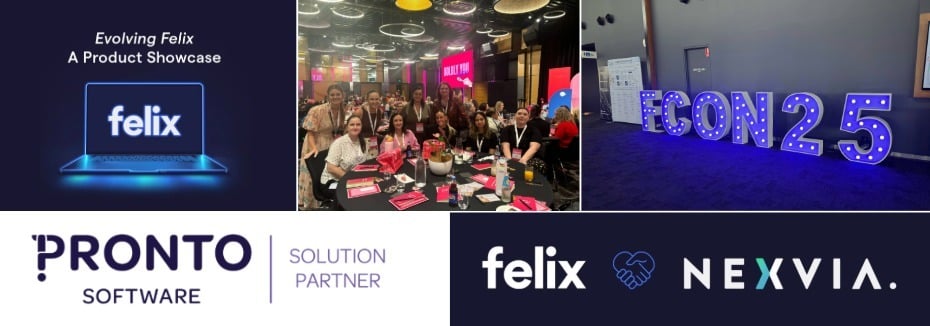The digital revolution is transforming every aspect of business, and procurement is no exception. Organisations are increasingly embracing digital procurement and vendor management solutions to streamline processes, improve efficiency, and gain valuable insights into their supply chains. However, despite the potential benefits, a significant number of digital transformation initiatives in procurement fall short of expectations.
So, what separates successful digital procurement transformations from those that falter? The answer lies in a multi-faceted approach that goes beyond simply choosing the right technology.
The 5 components of change management
Imagine the digital transformation process as a complex equation (like the Lippitt Model). Within this equation, five key components play a vital role: Vision, Skills, Incentives, Resources, and an Action Plan.

Vision
A clear and compelling vision is the cornerstone of any transformation effort. It guides the direction and provides a sense of purpose for all stakeholders involved. Without a vision, confusion is inevitable as team members struggle to understand the goals and benefits of the transformation.
Examples of a Digital Procurement vision:
- Democratise procurement: Enable decentralised decision making while maintaining oversight and governance.
- Build vendor relationships: Foster strong, collaborative relationships with vendors to ensure mutual benefits and long-term success.
- Eliminate manual work: Streamline processes to reduce manual tasks, allowing teams to focus on strategic, value-adding activities.
Skills
Having the right skills is critical to implementing and sustaining digital transformation. A lack of necessary skills among employees can lead to anxiety and hinder the adoption of new technologies.
Action steps:
- Training programs: Invest in comprehensive training and development programs to upskill existing employees.
- Expert hiring: Bring in experts or consultants to fill any skill gaps and provide guidance during the transition period.
By equipping your team with the necessary skills, you build confidence and competence, which are crucial for the successful implementation of new systems.
Incentives
Incentives play a significant role in motivating employees to embrace change. Without proper incentives, there is a high likelihood of resistance, as employees may not see the personal benefits of adopting new systems.
Action steps:
- Rewards system: Develop a rewards system that recognises and rewards early adopters and those who contribute significantly to the transformation process.
- Clear communication: Clearly communicate the benefits of the new system, both at an organisational and personal level, to get buy-in from all stakeholders.
Incentives help to create a positive attitude towards change, reducing resistance and fostering a culture of innovation.
Resources
Adequate resources are essential for the success of any digital transformation initiative. This includes financial resources, time, and access to necessary technologies and tools. Without sufficient resources, frustration can set in, derailing the entire project.
Action steps:
- Budget allocation: Ensure that the budget allocation covers all aspects of the transformation, including training, technology, and support.
- Tool provision: Provide the necessary tools and technologies to support new processes, ensuring they are user-friendly and accessible.
Proper resource allocation ensures that teams have what they need to successfully implement and sustain the transformation.
Action plan
A detailed and realistic action plan is crucial for guiding the implementation process. Without a clear plan, initiatives may result in false starts, leading to wasted time and resources.
Action steps:
- Comprehensive planning: Develop a comprehensive project plan with clear milestones, deadlines, and responsibilities.
- Ongoing monitoring: Implement a system for ongoing monitoring and adjustment to keep the project on track and address issues as they arise.
An actionable plan provides a roadmap for the transformation process, helping to keep all activities aligned and focused on achieving the desired outcomes.
Leveraging tech vendors for guidance and expertise
One critical yet often overlooked aspect of successful digital transformation is leveraging the expertise and guidance of tech vendors. Companies like Felix, which understand the importance of change management, can provide invaluable support throughout the transformation process.
Benefits of vendor expertise
- Best practices: Tech vendors bring a wealth of experience and industry best practices that can help avoid common pitfalls.
- Customisation: Vendors can tailor solutions to meet the specific needs of your organisation, ensuring a better fit and higher adoption rate.
- Training and support: Vendors often provide training and ongoing support to help your team get up to speed and maintain the new system.
- Troubleshooting: Having expert assistance available can significantly reduce downtime and ensure a smoother transition.
Action steps:
- Engage early: Involve your tech vendor early in the planning process to gain insights and incorporate their expertise into your strategy.
- Collaborative approach: Work collaboratively with the vendor to develop a customised implementation plan that addresses your unique challenges and objectives.
- Ongoing partnership: Maintain an ongoing partnership with the vendor to benefit from continuous support and updates.
Check out our previous webinar on tips for successful procurement tech implementation.
Equipping yourself for the buying committee
As a champion for digital procurement transformation, you'll likely face scrutiny from the buying committee, including potential objections from IT or executives. Here's how to address some common concerns:
Objection: "Digital transformation is too expensive."
Response: While there will be an initial investment, a well-designed digital procurement solution can deliver significant cost savings over time. Highlight the potential for increased efficiency, reduced manual tasks, and improved contract negotiation power.
Objection: "Our IT department is already overloaded."
Response: Partner with technology vendors who provide comprehensive implementation support and ongoing maintenance. Many solutions are cloud-based, minimising the burden on your internal IT team.
Objection: "Change is disruptive. Our team is resistant."
Response: Emphasise the importance of change management. Highlight how the vendor can support your team through training and user adoption programs to ensure a smooth transition and maximise system adoption.
Objection: "We don't have the time or resources for a complex implementation."
Response: Choosing a vendor with a proven track record and a strong focus on user experience can significantly streamline implementation. Many solutions offer intuitive interfaces and easy-to-use functionalities, minimising the need for extensive training.
Building a compelling case for digital transformation
By equipping yourself with a deep understanding of digital procurement transformation and the potential pitfalls, you can become a champion who effectively advocates for change. Here are some additional tips to build a compelling case:
Gather data and benchmark
Quantify the current challenges faced by your procurement department. Collect data on inefficiencies, errors, and missed opportunities. Research industry benchmarks to demonstrate how competitors are leveraging digital solutions for a competitive advantage.
Focus on ROI
Develop a clear return on investment (ROI) justification for the proposed digital procurement solution. Identify areas where cost savings can be achieved and quantify the potential improvements in efficiency and productivity.

Focus on user benefits
Don't just focus on cost savings. Highlight the benefits for your procurement team themselves. Show how the new solution will free them from repetitive tasks, allowing them to focus on more strategic and value-added activities.
Pilot the solution
If possible, consider a pilot program with a small team to showcase the potential benefits of the proposed solution. This allows you to gather real-world data and demonstrate success to the buying committee. Leverage the vendor's expertise to design and implement a smooth pilot program.
Choose the right partner
Selecting the right digital procurement vendor is crucial for success. Look for a provider with a strong track record in your industry, a proven solution with high user satisfaction ratings, and a commitment to supporting your change management process.
Conclusion
Digital transformation in procurement and vendor management is a complex but essential journey for modern organisations. By understanding and addressing the key components of change management—Vision, Skills, Incentives, Resources, and an Action Plan—organisations can significantly increase their chances of success.
Leveraging the expertise of tech vendors like Felix can provide additional support and guidance, ensuring a smoother and more effective transformation process. By proactively addressing concerns from IT and executive teams, champions of digital transformation can secure the necessary buy-in and drive their organisations towards a more efficient and competitive future.
Finally, feel free to get in touch to see how we can help you build a business case for digital procurement.

Recent Articles
Supplier Relationship Management: Top 10 Do's and Don'ts.
Supplier relationship management (SRM) is the backbone of a resilient supply chain. When procurement teams manage suppliers effectively, they reduce risk, improve performance, and streamline delivery across large project environments. Whether you are modernising your vendor management system or replacing manual spreadsheets, these essential do's and don'ts will help you strengthen your SRM strategy.
2025 in review: Milestones, insights and achievements
2025 – a year of that brought meaningful developments for Felix as we continue to address the evolving needs of organisations navigating complex supply-chain environments.
Top 10 reasons for a centralised vendor database
As organisations grow, so does the complexity of managing vendor relationships. Many still rely on spreadsheets or siloed systems, which can lead to inefficiencies, data inconsistencies, and compliance risks. A centralised vendor database offers a smarter, more scalable solution that brings structure, visibility, and control to procurement operations.
Here are the top 10 reasons why centralising your vendor data is a strategic move.
Let's stay in touch
Get the monthly dose of supply chain, procurement and technology insights with the Felix newsletter.







